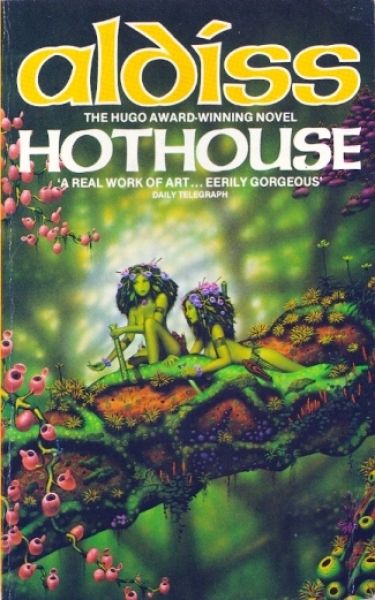Cruel Garden
Hothouse
By Brian W. Aldiss

27 Aug, 2017
Because My Tears Are Delicious To You
0 comments
1962’s Hugo-winning Hothouse is a standalone SF novel by Brian Aldiss.
In a distant future, the Earth is tide-locked to the Sun, while the Moon has retreated to one of the Earth-Sun Lagrange points.On the illuminated side of Earth, a vast banyan tree dominates the land. In this overheated world, voracious plants dominate. Only four groups of insects still exist on the banyan-dominated land: wasps, bees, ants and termites. All other animals are extinct.
All, save for the stunted, degenerate descendants of humanity.
Much reduced from their glory days, the diminutive humans are food for the rapacious mobile plants of this era. Constant vigilance is required simply to avoid further reductions in population. A child’s death convinces tribal leader Lily-yo that she and her fellow adults have grown too old to protect the children. The prudent thing to do is for the elders to go up, leaving the children under the leadership of Toy.
“Going up” means concealing oneself in seed pods that are then attached to Traversers, vast spider-like plants whose great webs now connect the Earth and the Moon. Those who survive the trip wake to find themselves transformed by radiation. To say more would be spoileriffic.
On Earth, Toy is continually challenged by proud Gren, who is convinced that he would make a better leader than Toy, because he’s a male. But Toy knows that solidarity is the key to survival; squabbling leaves the youths more vulnerable to predation. Unwilling to surrender her leadership and unable to bring Gren to heel, Toy exiles Gren from the tribe.
Accompanied by his love-interest Poyly, Gren sets out to find a new home. What follows is a lengthy tour of a weird, transformed Earth — as well as a very unwelcome revelation. The aging sun is growing ever more unstable. The Earth itself is doomed.
~oOo~
This novel is set far enough into the future that the solar system has been significantly transformed. Aldiss is kind enough to assure the readers that some things remain the same.
‘My fruit skin chafes my thighs,’ Poyly said, with a womanly gift for irrelevance that eons of time had not quenched.
Readers may be astounded to learn Le Guin once declined to blurb an Aldiss anthology on grounds of egregious sexism.
Putting the Moon in either of the L4 or L5 Lagrange points is about the only way to keep it tide-locked to the Earth while simultaneously tide-locking the Earth to the Sun1. Unfortunately, such anarrangement with the Moon, Earth and Sun is unlikely to be stable. In fact, some models suggest (or suggested; I have not kept up on this) that the Proto-Earth had a companion named Theia in very similar relationship, which as we all know led to this:

Aldiss knew his arrangement was nonsense, but the visual of an Earth-Moon system festooned with webs was just too cool. Take that, mere plausible orbital dynamics2!
Aldiss’ Earth is a jungle gone mad under a brighter sun, where life is wildly energetic, voracious, and generally short lived. There’s always a bigger fish — or in the case of Hothouse Earth, some bigger, meaner, hungrier plant. It is not surprising that Aldiss served in Burma in the Second World War, as the novel does suggest a Brit reacting to the wild fecundity of a forest bathed in direct sunlight and watered by monsoon rains3.
(It would be interesting to compare and contrast Aldiss’ Hothouse to Alan Dean Foster’s 1975 Midworld. Which I could now do if only I had reread the latter at any point in the last forty years.As I recall, Foster’s vision of planetary jungle was uncontaminated by any actual experience of rain forests.)
Gren and his evolving cast of all too edible companions may seem to inhabit a tiny society much less populous, powerful, and complex than those of our own era. Of course, you may prefer to marvel that humans managed to survive for billions of years. Go team Hominid!
There is, we eventually learn, a good reason why the humans of umpty million years from now are not the sharpest pencils in the box. How it was we became intelligent in the first place and what happened to cost us some of our intellectual skills is a plot point that shapes a good part of the book4. If the reader becomes frustrated by Gren and company’s bad life choices, be aware there is a reason for them beyond the author’s desire for his characters to have a series of near-death experiences. Well, in addition to.
Hothouse is available here (Amazon) and here (Chapters-Indigo).
- Worlds with long days tend not to have moons, because moons orbiting faster than their primary’s day is long are subject to forces that make them fall out of the sky. The classic example is Mars’ low-orbiting moon Phobos, which is slowly dropping in altitude while being pulled apart by tidal forces.
- Aldiss does let readers know that events that are rapid on an astronomical scale appear glacially slow to humans.
- People from Great Britain, British Columbia, or Washington may want to ask their distant friends to explain the concept of “direct sunlight.”
While raising the question of “why don’t people exposed to antifungals become dumber?” But I spoiler.
Onewonders if Brian Stableford’s TheCity of the Sunwas in any way influenced by Aldiss’ fungal speculations.
